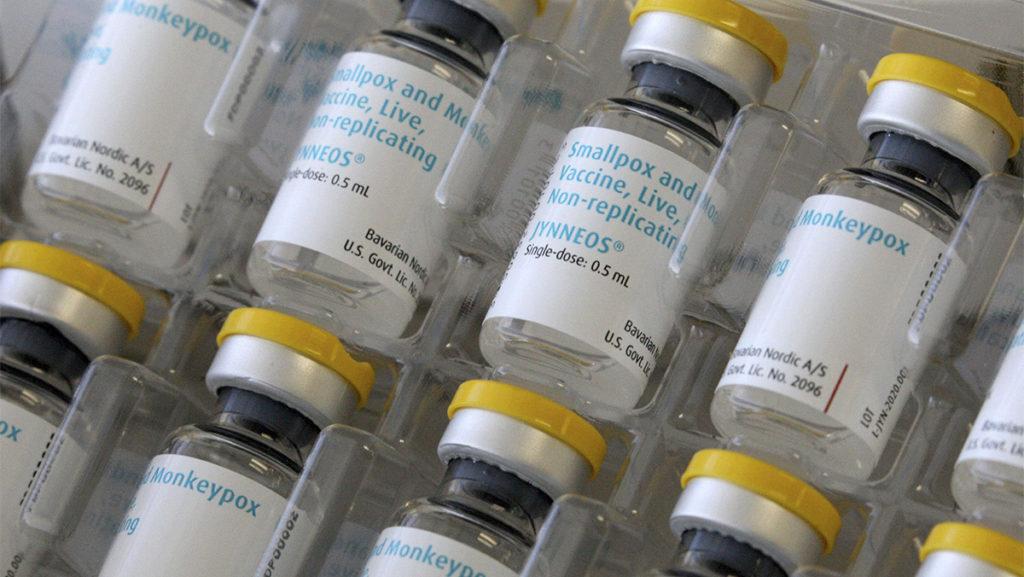Ithaca College added resources for students to mitigate the spread of the mpox virus, formerly known as monkeypox, in summer 2022, but as case numbers have fallen, some students’ concern for the virus has decreased.
According to the Centers for Disease Control and Prevention (CDC), mpox is a viral infection that causes flu-like illness and a rash on the face, chest, hands, mouth, genitals or feet. Mpox is spread through contact with an infected person’s lesions, bodily fluids or close face-to-face contact.
The U.S. Department of Health & Human Services (HHS) declared the mpox outbreak a public health emergency in August 2022 because of the virus’s rapid spread. In December 2022, HHS announced in a press release that it would not extend the public health emergency for mpox, which expired Jan. 31. The press release said the government would continue to track mpox cases and invited at-risk individuals to receive a free mpox vaccine.
Senior Sophia Roy said she was originally concerned that mpox would become a pandemic like COVID-19, but she has not thought about mpox since cases first started to increase in the summer.
“I haven’t heard [about] it in class or the college, or not even people that I know,” Roy said. “No one is really talking about it. … I kind of forgot about it.”
First-year student Hope Oliveira said she has not heard about mpox since her seminar professor mentioned the increase in mpox cases in class during Fall 2022.
“[My professor] mentioned it, it was like an uptick,” Oliveira said. “That day, I was like, ‘Oh, maybe I should wipe down my stuff,’ but then I feel like after that I … wasn’t too worried. I guess it’s always something to be in the back of your mind.”
The World Health Organization announced in November 2022 that it planned to phase out the name “monkeypox” within the next year and relabel the virus as “mpox” to reduce potential racism and discrimination that stemmed from the name.
According to the CDC, 4,222 mpox cases were reported in New York State in 2022, which is about 14% of the nation’s total reported cases in 2022. Tompkins County has recorded four mpox cases as of Feb. 8, according to the New York State Department of Health (NYSDOH).
Samm Swarts, assistant director of Emergency Preparedness and Response, said via email that Tompkins County Whole Health meets weekly with administrators from Ithaca College, Cornell University and Tompkins Cortland Community College to provide updates on health topics like mpox. Swarts said via email that the college’s approach to mpox has not changed as cases have decreased.
“We take every public health concern seriously and we actively monitor the latest information to make informed decisions,” Swarts said. “We will continue to use this demeanor for mpox and any other communicable illness or disease that may come along. Our goal ultimately is to protect our campus community and we are always actively trying to do that.”
The first mpox case was reported in the United States in May 2022, according to the CDC. Mpox case numbers rose gradually through June. On July 1, there were 136 daily reported cases, which grew to 347 July 15 and 520 cases July 25. The United States reached a peak of 624 cases Aug. 1.
By Sept. 1, the CDC recorded less than 300 mpox cases per day in the U.S., which fell to 100 cases or fewer recorded each day since Oct. 3. There was an average of 3–5 cases recorded in the U.S. each day in January 2023.
The drop in mpox cases has been attributed to behavioral changes and increased distribution of the two-dose Jynneos vaccine.
The CDC identified men who have sex with men as the primary group at risk of contracting mpox. An online survey developed in partnership with the CDC and conducted by Emory University’s PRISM Health group found that about 50% of the gay, bisexual and other men who have sex with men surveyed said they decreased their number of sexual partners, one-time sexual encounters, and encounters with partners from dating apps because of the mpox outbreak.
The CDC recommended that men who have sex with men should receive either the Jynneos or ACAM2000 vaccine. The CDC said that about 700,000 people have received at least one dose of the Jynneos vaccine.
Hammond Health Center started offering the Jynneos vaccine for all students in October 2022. Jennifer Metzgar, director of Student Health Services, said the college received enough vaccine doses from the NYSDOH to vaccinate 50 students.
The mpox vaccine is free and the vaccine administration fee is charged to students’ private insurance or health care plans. Metzgar said 25 students have received the vaccine at Hammond Health Center since October.
“I actually have enough vaccine in house right now for an additional 25 students to receive two doses,” Metzgar said. “I think after that, it would kind of be dependent on the need or the requests from students.”
During Fall 2022, the college posted flyers with information about mpox symptoms, treatment and prevention around campus, including in residential buildings. The college also shared information about mpox through Intercom posts and social media campaigns. There has not been increased communication about mpox so far in Spring 2023 but resources still are available.
First-year student O’Niyah Hamilton said she saw the mpox flyers in her dorm hallways. She said she has not heard anything about mpox besides the posters and is not concerned about the virus. However, she said she appreciates that the college offers the vaccine and information about the virus for students.
“Luckily, I don’t think I’ve heard of anyone who has [had mpox], but having all of those resources open is gold,” Hamilton said. “It’s honestly so great because [mpox] is really, really bad.”









